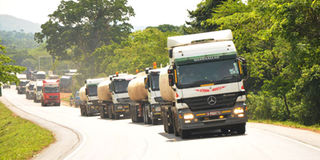UNBS broadens campaign against adulterated fuel

Fuel tankers make their way to Kampala. Uganda National Bureau of Standards has partnered with four major fuel distributors in the fight against adulteration of fuel. FILE PHOTO
What you need to know:
Risk areas. High cases of adulterated fuel likely to be found in rural areas, along major routes and borders.
Kampala.
Four major fuel companies are partnering with the Uganda National Bureau of Standards (UNBS) to teach consumers how to identify adulterated fuel, which makes up about three per cent of the national market, the bureau announced Wednesday.
Total Uganda Limited, which has petrol stations around the country, will distribute pamphlets in English and the vernacular languages to teach the public about adulterated fuel, said Lawrence Ssempagi, Total’s Depots and Distribution Manager.
Vivo Energy, Shell’s licensee in Africa, City Oil, and GAPCO Uganda Limited are the other fuel companies involved in the UNBS campaign, which will mark the bureau’s 25 years of service to Ugandans, according to the UNBS Executive Director, Ben Manyindo. “The adulteration of fuel has reduced since 2009. From 29 per cent to our latest figure in June, is three per cent,” said Mr Manyindo, who spoke to reporters at the Uganda Media Centre on Wednesday. The new campaign will build on the government’s Fuel Marking and Quality Monitoring Programme, which has helped reduce the instances of fuel adulteration, he said.
The programme, launched in 2009, saw UNBS and the Ministry of Energy and Mineral Development partnered to ensure “all fuel products destined for the Ugandan market (are) marked with a specialised colour chemical at the customs point of entry into the country to distinguish it as meeting the fuel standards required,” according to a ministry press release.
“The world over, the average (rate of adulterated fuel) should be about five per cent, so three per cent is good,” said Mr Manyindo.
Fuel adulteration routes
Though the rates of adulterated fuel have diminished, Mr Manyindo concedes that “when you move away from the urban area towards the countryside (the average) is likely more (than three percent) and our goal is to reduce that within five per cent.”
Rural areas, like along the lakeshore, sometimes have no petrol station in reach, he explained. “So you will have to have those mobile trucks (selling fuel). Unfortunately, those mobile trucks are the biggest source of adulteration. That is a policy issue the ministry is working on.” Major routes like Masaka and Mityana roads in Central Region also see more cases of adulterated fuel. Borders are also an issue for importing poor quality oil, said Mr Lawrence Ssempagi of Total.
Name and shame
Earlier this year (May), the Commissioner for Petroleum Supply, Ministry of Energy, Rev Frank Tukwasibwe, said government would name and shame dealers selling adulterated fuel and consumers will also be discouraged from buying their products.
Speaking at a workshop that brought together fuel markers, dealers and the industry regulator, Rev Tukwasibwe said beginning this financial year (2014/15), fuel dealers caught with adulterated fuel will be published in the media with a warning that they should be avoided.




